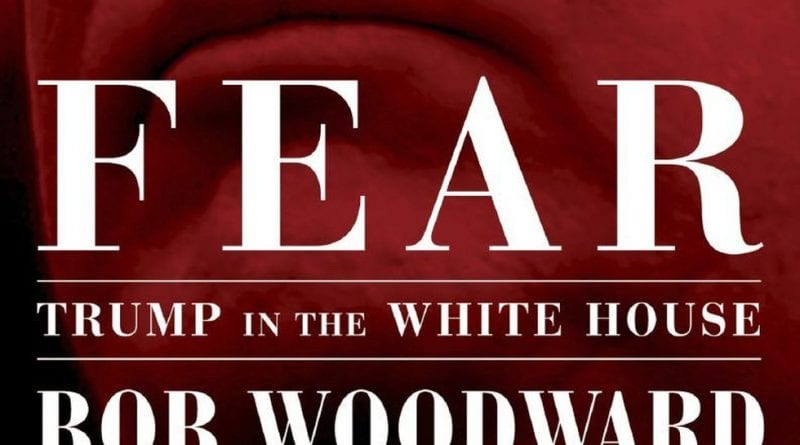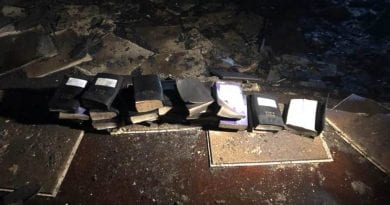Explosive Woodward book reveals ‘nervous breakdown’ of Trump White House…”General Kelly Chief of Staff: “We are in crazytown”
John Dowd was convinced that President Trump would commit perjury if he talked to special counsel Robert S. Mueller III. So, on Jan. 27, the president’s then-personal attorney staged a practice session to try to make his point.
In the White House residence, Dowd peppered Trump with questions about the Russia investigation, provoking stumbles, contradictions and lies until the president eventually lost his cool.
“This thing’s a damn hoax,” Trump erupted at the start of a 30-minute rant that finished with him saying, “I don’t really want to testify.”
The dramatic and previously untold scene is recounted in “Fear,” a forthcoming book by Bob Woodward that paints a harrowing portrait of the Trump presidency, based on in-depth interviews with administration officials and other principals.
Woodward writes that his book is drawn from hundreds of hours of interviews with firsthand participants and witnesses that were conducted on “deep background,” meaning the information could be used but he would not reveal who provided it. His account is also drawn from meeting notes, personal diaries and government documents.
Woodward depicts Trump’s anger and paranoia about the Russia inquiry as unrelenting, at times paralyzing the West Wing for entire days. Learning of the appointment of Mueller in May 2017, Trump groused, “Everybody’s trying to get me”— part of a venting period that shellshocked aides compared to Richard Nixon’s final days as president.
The 448-page book was obtained by The Washington Post. Woodward, an associate editor at The Post, sought an interview with Trump through several intermediaries to no avail. The president called Woodward in early August, after the manuscript had been completed, to say he wanted to participate. The president complained that it would be a “bad book,” according to an audio recording of the conversation. Woodward replied that his work would be “tough,” but factual and based on his reporting.
A central theme of the book is the stealthy machinations used by those in Trump’s inner sanctum to try to control his impulses and prevent disasters, both for the president personally and for the nation he was elected to lead.
Woodward describes “an administrative coup d’etat” and a “nervous breakdown” of the executive branch, with senior aides conspiring to pluck official papers from the president’s desk so he couldn’t see or sign them.
Again and again, Woodward recounts at length how Trump’s national security team was shaken by his lack of curiosity and knowledge about world affairs and his contempt for the mainstream perspectives of military and intelligence leaders.
At a National Security Council meeting on Jan. 19, Trump disregarded the significance of the massive U.S. military presence on the Korean Peninsula, including a special intelligence operation that allows the United States to detect a North Korean missile launch in seven seconds vs. 15 minutes from Alaska, according to Woodward. Trump questioned why the government was spending resources in the region at all.
“We’re doing this in order to prevent World War III,” Defense Secretary Jim Mattis told him.
After Trump left the meeting, Woodward recounts, “Mattis was particularly exasperated and alarmed, telling close associates that the president acted like — and had the understanding of — ‘a fifth- or sixth-grader.’ ”
In Woodward’s telling, many top advisers were repeatedly unnerved by Trump’s actions and expressed dim views of him. “Secretaries of defense don’t always get to choose the president they work for,” Mattis told friends at one point, prompting laughter as he explained Trump’s tendency to go off on tangents about subjects such as immigration and the news media.
Inside the White House, Woodward portrays an unsteady executive detached from the conventions of governing and prone to snapping at high-ranking staff members, whom he unsettled and belittled on a daily basis.
White House Chief of Staff John F. Kelly frequently lost his temper and told colleagues that he thought the president was “unhinged,” Woodward writes. In one small group meeting, Kelly said of Trump: “He’s an idiot. It’s pointless to try to convince him of anything. He’s gone off the rails. We’re in Crazytown. I don’t even know why any of us are here. This is the worst job I’ve ever had.”
Reince Priebus, Kelly’s predecessor, fretted that he could do little to constrain Trump from sparking chaos. Woodward writes that Priebus dubbed the presidential bedroom, where Trump obsessively watched cable news and tweeted, “the devil’s workshop,” and said early mornings and Sunday evenings, when the president often set off tweetstorms, were “the witching hour.”
Trump apparently had little regard for Priebus. He once instructed then-staff secretary Rob Porter to ignore Priebus, even though Porter reported to the chief of staff, saying that Priebus was “‘like a little rat. He just scurries around.’”
Few in Trump’s orbit were protected from the president’s insults. He often mocked former national security adviser H.R. McMaster behind his back, puffing up his chest and exaggerating his breathing as he impersonated the retired Army general, and once said McMaster dresses in cheap suits, “like a beer salesman.”
After Syrian leader Bashar al-Assad launched a chemical attack on civilians in April 2017, Trump called Mattis and said he wanted to assassinate the dictator. “Let’s fucking kill him! Let’s go in. Let’s kill the fucking lot of them,” Trump said, according to Woodward.
Mattis told the president that he would get right on it. But after hanging up the phone, he told a senior aide: “We’re not going to do any of that. We’re going to be much more measured.” The national security team developed options for the more conventional airstrike that Trump ultimately ordered.
At one point, Porter, who departed in February amid domestic abuse allegations, is quoted as saying, “This was no longer a presidency. This is no longer a White House. This is a man being who he is.”
Such moments of panic are a routine feature, but not the thrust of Woodward’s book, which mostly focuses on substantive decisions and internal disagreements, including tensions with North Korea as well as the future of U.S. policy in Afghanistan.
Woodward recounts repeated episodes of anxiety inside the government over Trump’s handling of the North Korean nuclear threat. One month into his presidency, Trump asked Dunford for a plan for a preemptive military strike on North Korea, which rattled the combat veteran.
In the fall of 2017, as Trump intensified a war of words with Kim Jong Un, nicknaming North Korea’s dictator “Little Rocket Man” in a speech at the United Nations, aides worried the president might be provoking Kim. But, Woodward writes, Trump told Porter that he saw the situation as a contest of wills: “This is all about leader versus leader. Man versus man. Me versus Kim.”
The book also details Trump’s impatience with the war in Afghanistan, which had become America’s longest conflict. At a July 2017 National Security Council meeting, Trump dressed down his generals and other advisers for 25 minutes, complaining that the United States was losing, according to Woodward.
“The soldiers on the ground could run things much better than you,” Trump told them. “They could do a much better job. I don’t know what the hell we’re doing.” He went on to ask, “How many more deaths? How many more lost limbs? How much longer are we going to be there?”
The president’s family members, while sometimes touted as his key advisers by other Trump chroniclers, are minor players in Woodward’s account, popping up occasionally in the West Wing and vexing adversaries.
Woodward recounts an expletive-laden altercation between Ivanka Trump, the president’s eldest daughter and senior adviser, and Stephen K. Bannon, the former chief White House strategist.
“You’re a goddamn staffer!” Bannon screamed at her, telling her that she had to work through Priebus like other aides. “You walk around this place and act like you’re in charge, and you’re not. You’re on staff!”
Ivanka Trump, who had special access to the president and worked around Priebus, replied: “I’m not a staffer! I’ll never be a staffer. I’m the first daughter.”
Such tensions boiled among many of Trump’s core advisers. Priebus is quoted as describing Trump officials not as rivals but as “natural predators.”
“When you put a snake and a rat and a falcon and a rabbit and a shark and a seal in a zoo without walls, things start getting nasty and bloody,” Priebus says.
Hovering over the White House was Mueller’s inquiry, which deeply embarrassed the president. Woodward describes Trump calling his Egyptian counterpart to secure the release of an imprisoned charity worker and President Abdel Fatah al-Sissi saying: “Donald, I’m worried about this investigation. Are you going to be around?”
Trump relayed the conversation to Dowd and said it was “like a kick in the nuts,” according to Woodward.
The book vividly recounts the ongoing debate between Trump and his lawyers about whether the president would sit for an interview with Mueller. On March 5, Dowd and Trump attorney Jay Sekulow met in Mueller’s office with the special counsel and his deputy, James Quarles, where Dowd and Sekulow reenacted Trump’s January practice session.





